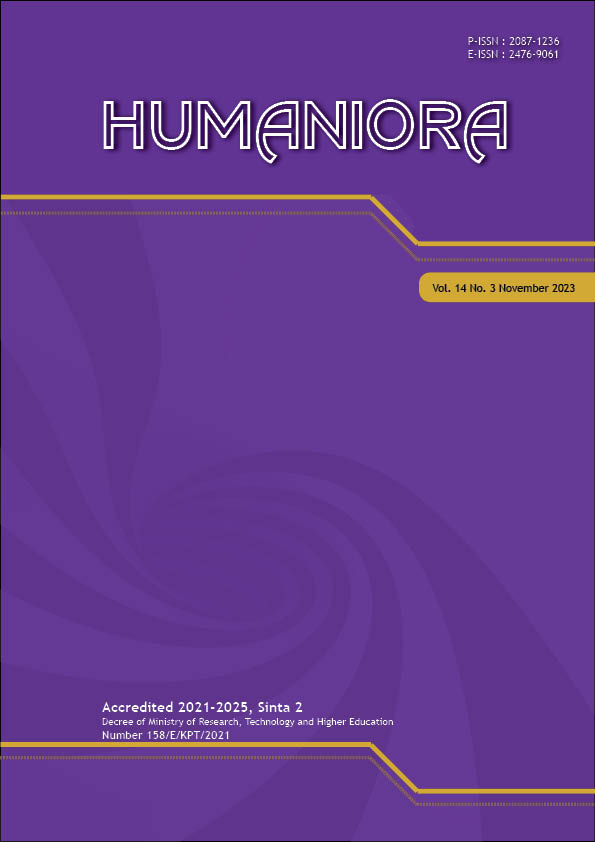“Gundala†an Indonesian Superhero Film and Its Influence on Audiences’ National Identity
DOI:
https://doi.org/10.21512/humaniora.v14i3.9808Keywords:
Gundala film, generation Z, national identityAbstract
The research aimed to find out and prove the impact of the film Gundala on its audience’s sense of national identity. The research was conducted by using the method of audience reception. The target audience of the survey was people who belong to the young adult category called Generation Z. The survey was conducted through the distribution of a seven-question questionnaire, and data were obtained from 53 respondents. The questions were designed according to the expression of four aspects reflected in the film plot: character, accessories, ethnoscape, and community. The results of the questionnaire data are presented through frequency distribution tables, measured according to Likert scale positive statements. Based on the survey results, the Generation Z audience has an awareness of national identity reflected in the film “Gundalaâ€. The results of the qualitative analysis of the questionnaire data show that the film “Gundala†has a minor but discernible impact on the audience’s sense of national identity.
Plum Analytics
References
Aminuddin, M. F., & Attamimi, N. H. (2019). From retail to grocery: Money politics in 2014 Indonesian legislative election. Politik Indonesia: Indonesian Political Science Review, 4(11), 99-120. https://doi.org/10.15294/ipsr.v4i1.12609.
Anugerah, P. (2019). Gundala: Bagaimana Joko Anwar mereka ulang “jagoan†klasik Indonesia. Retrived from https://www.bbc.com/indonesia/majalah-49486240.
Arief, R., Prakoso, L. Y., & Risman, H. (2021). Understanding national identity to create love and proud of being a part of the Indonesian nation. Jurnal Inovasi Penelitian, 1(11), 2549-2556. https://doi.org/10.47492/jip.v1i11.518.
Boiliu, N. I., Sihombing, A. F. Sampaleng, D., Widjaja, F. I., & Simanjuntak, F. (2022). Human rights: The convergence of the second sila of Pancasila and Hans Kung’s global ethics in Indonesia. Hervormde Teologiese Studies, 78(4), 1-6. https://doi.org/10.4102/hts.v78i4.6933.
Briandana, R. (2019). Television and national identity: An ethnography of television audience in the border of Indonesia-Malaysia. Jurnal Ilmu Sosial dan Ilmu Politik, 23(1), 72-85. https://doi.org/10.22146/jsp.37586.
de Beus, E. (2022). Marvel presents a global utopia and confronts nationalism: Eternals as a new mythology forged from western roots. Humanities, 11(60), 1-9. https://doi.org/10.3390/h11030060.
Debby, Y., Intan, T., Hartiana, P., & Krisdinanto, N. (2020). Desakralisasi film horor Indonesia dalam kajian reception analysis. ProTVF, 4(1), 1-19. https://doi.org/https://doi.org/10.24198/ptvf.v4i1.24171.
González-velázquez, C. A., Shackleford, K. E., Keller, L. N., Vinney, C., & Drake, L. M. (2020). Watching Black Panther with racially diverse youth: Relationships between film viewing, ethnicity, ethnic identity, empowerment, and wellbeing. Review of Communication, 20(3), 250-259. https://doi.org/10.1080/15358593.2020.1778067.
Hadibroto, J. U. (2019). Anomalus dan brand aura karakter superhero pada film Gundala: Analisis struktur naratif. Journal of Strategic Communication, 10(1), 37-45. https://doi.org/10.35814/coverage.v10i1.1231.
Hamid, A., & Wibisana, W. (2022). Research in business & social science the implementation of labor strike rights: Between freedom and order in Indonesia. International Journal of Research in Business and Social Science, 11(3), 257-264. https://doi.org/https://doi.org/10.20525/ijrbs.v11i3.1736.
Handoko, P., & Farida, A. (2021). In the state administration system of Indonesia: No space for Khilafah! HTS Teologiese Studies/Theological Studies, 77(4), 1-10. https://doi.org/10.4102/hts.v77i4.6510.
Handoyo, E. (2021). Anti-corruption education at Universitas Negeri Semarang: What benefits can students get? Turkish Journal of Computer and Mathematics Education, 12(6), 2672-2685. https://doi.org/10.17762/turcomat.v12i6.5768.
Hariyono. (2014). Ideologi Pancasila: Roh progresif nasionalisme Indonesia (2nd Ed.). Malang: Intrans Publishing.
Hidayaturrahman, M., Ngarawula, B., & Sadhana, K. (2022). Political investors: Political elite oligarchy and mastery of regional resources in Indonesia. Asian Journal of Comparative Politics, 7(2), 269-281. https://doi.org/10.1177/2057891120917213.
Imaji Journal. (2021). Wawancara: Joko Anwar. IMAJI: Film, Fotografi, Televisi, & Amp; Media Baru, 12(2), 99-103.
Indrayana, D. (2017). Money politics in a more democratic Indonesia: An overview. Australian Journal of Asian Law, 18(2), 1-15. https://doi.org/10.3316/agis_archive.20181796.
Irsyaddillah, M. (2022). Aspek sosial dan nilai pendidikan karakter dalam film Gundala sutradara Joko Anwar. Prosiding Seminar Nasional Pendidikan Fakultas Keguruan Dan Ilmu Pendidikan (FKIP) Universitas Islam Majapahit Tahun 2022. Mojokerto, Indonesia. pp. 240-255.
Jiwandono, I. S. (2020). Dinamika sosial sikap narcisstic aksi demonstrasi mahasiswa dalam prospek demokrasi Indonesia. Equilibrium: Jurnal Pendidikan, 8(1), 34-40. https://doi.org/10.26618/equilibrium.v8i1.3012.
Lebo, D., Pramono, B., Prakoso, L. Y., Risman, H., & Suhirwan, S. (2021). The total war strategy through optimizing the understanding of Pancasila values in the millenial era. Journal of Social and Political Sciences, 4(2), 32-40. https://doi.org/10.31014/aior.1991.04.02.273.
Leech, T. G. J., Jacobs, S., & Watson, D. (2020). Factors associated with binge drinking during the transition into adulthood: Exploring associations within two distinct young adult age ranges. Substance Abuse: Research and Treatment, 14, 1-8. https://doi.org/10.1177/1178221820951781.
Ngong, P. A. (2021). The reception of Cameroon films and home videos in student residential areas: The case of Bambili – Cameroon. Cinej Cinema Journal, 9(1), 372-392. https://doi.org/10.5195/cinej.2021.357.
Pertiwi, M., Ri’aeni, I., & Yusron, A. (2020). Analisis resepsi interpretasi penonton terhadap konflik keluarga dalam film “Dua Garis Biruâ€. Jurnal Audiens, 1(1), 1-8. http://dx.doi.org/10.18196/ja.1101.
Peters, B. (2002). A new look at ‘national identity’ how should we think about ‘collective’ or ‘national identities’? Are there two types of national identities? Does Germany have an ethnic identity, and is it different? European Journal of Sociology, 43(1), 3-32. https://doi.org/10.1017/S0003975602001005.
Pranatawijaya, V. H., & Priskila, R. (2019). Pengembangan aplikasi kuesioner survey berbasis web menggunakan skala Likert dan Guttman. Sains dan Informatika, 5(2), 128-137. https://doi.org/10.34128/jsi.v5i2.185.
Rachmad, T. H. (2020). Membongkar konsep “Heroisme’ di film Gundala. Public Corner, 15(2), 12-24. https://doi.org/10.24929/fisip.v15i2.1169.
Rastati, R. (2022). Internalizing Pancasila through pop culture and youth community. Jurnal Masyarakat dan Budaya, 24(2), 219-230. https://doi.org/10.55981/jmb.1601.
Saptanto, D., & Dewi, M. K. (2020). Gundala and Gatotkaca in the concept of modern Indonesian superheroes: Comparative analysis of the Indonesian and American superheroes. EduLite Journal of English Education, Literature, and Culture, 5(1), 136-147. https://doi.org/10.30659/e.5.1.136-147.
Smith, A. (2005). Image of the nation cinema, art, and national identity. In M. Hjort & S. MacKenzie (Eds.), Cinema and Nation (pp. 41–52). UK: Routledge.
Sukma, B. P. (2021). Constructing and promoting national identity through tourism: A multimodal discourse. Linguistik Indonesia, 39(1), 63-77. https://doi.org/10.26499/li.v39i1.197.
Susanto, S. (2016). Pancasila sebagai identitas dan nilai luhur bangsa: Analisis tentang peran Pancasila sebagai modal sosial berbangsa dan bernegara. Jurnal Ilmiah Ilmu Pemerintahan, 2(1), 44-52. https://doi.org/10.14710/jiip.v2i1.1634.
Wibowo, A. (2021). Jenang: Food production system based on myths in Java, Indonesia. 3rd International Conference on Food Science and Engineering, 828, 1-7. https://doi.org/10.1088/1755-1315/828/1/012056.
Windari, T. (2021). National identity attachment and its variables. Journal of International Women’s Studies, 22(3), 81-96.
Yuliatin, Y., Husni, L., Hirsanuddin, H., & Kaharudin, K. (2021). Character education based on local wisdom. Journal of Legal, Ethical and Regulatory Issues, 24(1), 1-11.
Downloads
Published
How to Cite
Issue
Section
License
Copyright (c) 2023 Marisa Rianti Sutanto, Marcella Melly Kosasih

This work is licensed under a Creative Commons Attribution-ShareAlike 4.0 International License.
Authors who publish with this journal agree to the following terms:
a. Authors retain copyright and grant the journal right of first publication with the work simultaneously licensed under a Creative Commons Attribution License - Share Alike that allows others to share the work with an acknowledgment of the work's authorship and initial publication in this journal.
b. Authors are able to enter into separate, additional contractual arrangements for the non-exclusive distribution of the journal's published version of the work (e.g., post it to an institutional repository or publish it in a book), with an acknowledgment of its initial publication in this journal.
c. Authors are permitted and encouraged to post their work online (e.g., in institutional repositories or on their website) prior to and during the submission process, as it can lead to productive exchanges, as well as earlier and greater citation of published work.
USER RIGHTS
All articles published Open Access will be immediately and permanently free for everyone to read and download. We are continuously working with our author communities to select the best choice of license options, currently being defined for this journal as follows: Creative Commons Attribution-Share Alike (CC BY-SA)
























